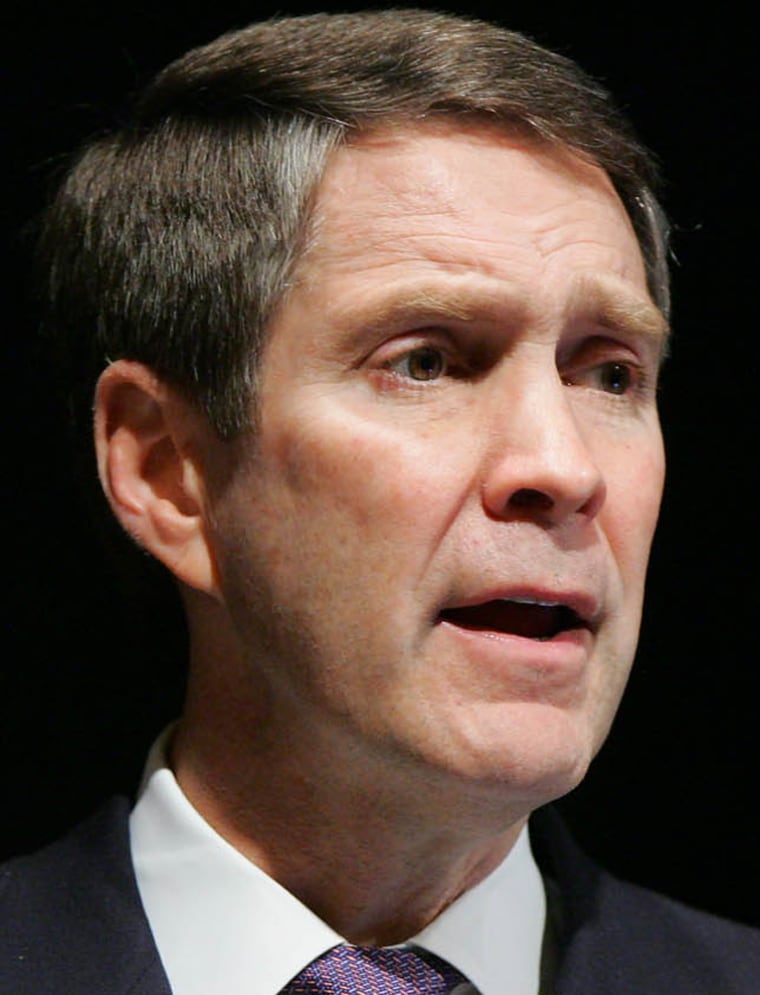It may seem like Sen. Bill Frist has found religion in recent weeks.
At least, that’s what critics say about the Senate majority leader’s recent alignment with social conservative groups on high-profile issues. Their charge is that Frist is playing to religious groups to gather support for political issues — and potentially for a future presidential race.
The Tennessee Republican took some heat when Congress stepped into a legal fight over the life of a brain-damaged Florida woman last month. The critics have grown louder since he agreed to participate in an event on Sunday organized by Christian groups trying to rally churchgoers to support ending the judicial filibuster.
“He seems to be going out of his way to pander to the radical religious right leaders,” said Ralph Neas, president of People for the American Way, a liberal group that has worked to block several of President Bush’s appointments to the courts. “Many people have commented that it seems to be commensurate with his aspirations to be president of the United States.”
Sunday broadcast
Sunday’s event, organized by the conservative Family Research Council, will be in a Louisville, Ky., church and broadcast across the country. Fliers for “Justice Sunday” charge the filibuster is “being used against people of faith.”
Frist’s office says he plans to submit a four-minute videotape with the same Constitution-focused message he has given other groups.
But his participation has raised loud protests. The Democratic Senatorial Campaign Committee said it sent Frist a petition Friday signed by 20,000 people asking him “to abandon such dishonest and irresponsible tactics that politicize faith, abuse power and drown out the voice of ordinary Americans.”
The leaders of several nationwide denominations on Friday joined the chorus urging Frist to reconsider his participation in the event. Among them was the Rev. Clifton Kirkpatrick, the stated clerk of the Presbyterian Church (USA), Frist’s denomination.
Most people said Frist has the right to join Christian groups or ask for their backing on important issues but called the rhetoric surrounding Sunday’s event inflammatory.
“His presence is giving credibility to people who have made a stark political issue a litmus test for judging religion,” said C. Welton Gaddy, president of the Washington-based Interfaith Alliance and the pastor of a Louisiana church.
Shift in focus?
Frist is a conservative who has consistently supported the type of issues that rally right-leaning Christian groups. He was a leader of the opposition to gay marriage, and when he laid out an agenda on the first day of the 109th Congress in January, he mentioned “marriage, families and a culture of life that protects human dignity at every stage of development.”
A Frist spokesman said the Constitution has been the senator’s constant concern during the filibuster fight, and his position on Terri Schiavo, the brain-damaged Florida woman, was “clear and consistent” throughout the debate.
But some say there’s been a shift in his focus.
“If you think about Bill Frist since he was majority leader, his strong suit was his intersection of science and medicine ... and his rational good government,” said James Hudnut-Beumler, dean of Vanderbilt University’s Divinity School and a scholar of American religious history. “I think that’s still there, but to lead on a national stage, you have people who press you to come out on other issues and fronts.”
Higher aspirations?
Frist has said he will give up his Senate seat when his term ends next year, but he hasn’t answered — or discouraged — speculation that he will run for president in 2008.
Luis Lugo, director of the nonpartisan, non-advocacy Pew Forum on Religion & Public Life, said religion and religious groups are crucial factors for any candidate, Democrat or Republican.
“Any politician ... who aspires to public office ... has to come to terms with the fact that religious conservatives are a critically important part of the Republican Party,” he said.
Tapping into the political force of a religious group, however, can be a divisive process when closely held moral values are at stake. The filibuster debate comes up at a time when the nation is vociferously arguing over whether to trust “activist” judges.
“It’s a little bit of a third rail,” said Hudnut-Beumler. Frist is “hoping to draw some power from it. Electric trains do draw power from the third rail, but people sometimes do get electrocuted.”
Frist belongs to Presbyterian churches in Washington and Tennessee, has taken medical mission trips to Africa and other parts of the world, and is a regular at the National Prayer Breakfast. And even critics say it isn’t possible to discern a person’s true faith.
But Gaddy said he is concerned about “the transition from religion as a source of values and wisdom, to religion as a strategy for passing legislation or winning an election.”
“I don’t judge people’s motives,” he said. “If Sen. Frist sees this as an essential step in launching a presidential campaign, he’s more involved in a stumble than a step.”
